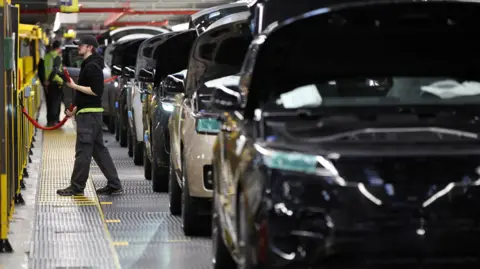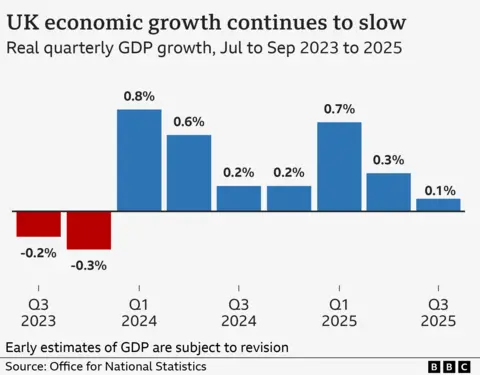 Reuters
ReutersGrowth in the UK economy slowed by more than expected to 0.1% in the July-to-September period, official figures show, as car production slumped.
The Office for National Statistics (ONS) said entertainment and real estate were among main drivers of growth in the quarter, but this was offset by weakness in manufacturing.
The economy shrank by 0.1% in the month of September, the ONS said, when there was a “marked” fall in car production following the impact of the cyber-attack on JLR.
The growth figures are the last to be released ahead of the Budget later this month, when Chancellor Rachel Reeves is expected to raise taxes in order to meet her self-imposed borrowing rules.
Analysts had expected growth in the third quarter to be 0.2%. The latest figure marks a slowdown from the 0.3% growth seen in the previous quarter, and the 0.7% expansion in the first three months of the year.
The Jaguar Land Rover cyber-attack began on 31 August, and resulted in one of the UK’s largest car makers halting production for five weeks.
The ONS said production output overall fell by 2% in September, and this was mainly caused by a 28.6% drop in car output following the cyber-attack.
Responding to the ONS data, Rachel Reeves said the UK had the fastest-growing economy in the G7 in the first half of the year, but said “there’s more to do to build an economy that works for working people”.
“At my Budget later this month, I will take the fair decisions to build a strong economy that helps us to continue to cut waiting lists, cut the national debt and cut the cost of living,” she said.
Shadow chancellor Mel Stride said the prime minister and chancellor were “in office but not in power” and claimed Sir Keir Starmer had “stripped the chancellor of responsibility for the Budget”.

ONS director of economic statistics Liz McKeown said that while there had been some growth in services and construction, they were weaker than in the previous quarter.
“Services were the main contributor to growth in the latest quarter, with business rental and leasing, live events and retail performing well, partially offset by falls in R&D and hair and beauty salons,” she said.
Ruth Gregory, deputy chief UK economist with Capital Economics, said that even without the drag on GDP growth by the JLR cyber-attack, the economy “is struggling to gain decent momentum”.
“With tax rises in the upcoming Budget likely to trim GDP by around 0.2% in 2026, there is little reason to think that GDP growth will accelerate much from here,” she said.
The weakness of the figures led some analysts to suggest there was now an increased chance of the Bank of England cutting interest rates when it meets next month.
Suren Thiru, economics director for the Institute of Chartered Accountants in England and Wales, said the figures may be enough “to push a majority of rate-setters to authorise another policy loosening”.

